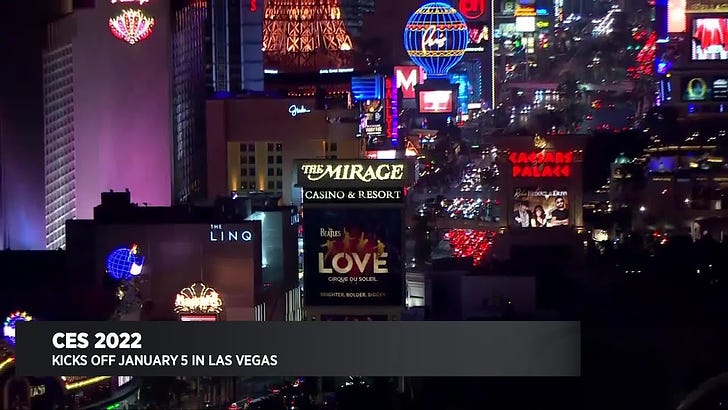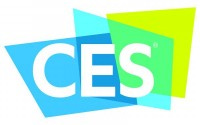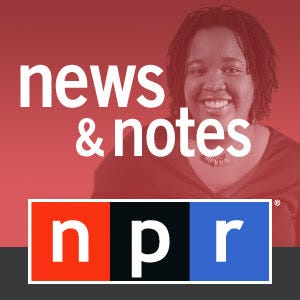Three Things Datebook for the week of 1/3/2022
This first datebook for the new year previews the Consumer Electronics Show in Las Vegas. Plus, the launch of Capital B and the 20th anniversary of The Tavis Smiley Show on NPR.
Happy New Year and welcome to the first Three Things Datebook for 2022!
THING ONE: The Most Influential Tech Event in the World
The calendar’s turn to a new year traditionally marks the annual Consumer Electronics Show in Las Vegas. After an entirely virtual CES in 2021, the “most influential tech event in the world” is happening this week, shortened by a day due to pandemic concerns to January 5-7, in person, with an option for attendees to attend virtually.
The team at Jacobs Media (Fred and Paul Jacobs) have been strong advocates over the years for radio leaders to pay attention to what is happening at the CES. Following last year’s virtual event, Fred shared six takeaways with Inside Radio that included the lasting impact of the pandemic on brands, including a more intentional focus on the environment, diversity, and inclusion. Fred also had some strong thoughts on radio and the digital dashboard and connected cars - two items essential to the industry’s future.
Despite several recent announcements of companies going virtual for this week’s event due to an increase in COVID cases stemming from the Omicron variant, the Consumer Technology Association, which runs the event, expects an estimated 40,000 to 60,000 attending in-person. The CES usually attracts around 170,000 attendees.
Jacobs Media is hosting two CES tours for broadcasters this week. Paul shared with me that one of the highlights of the broadcaster’s tour is an area called Eureka Park, which features hundreds of startups from around the world. Paul described it as something “like a tech flea market.”
"It’s a place where you get to talk to the actual visionaries from these companies and after a while begin to see the seeds being planted that will impact all of us in a few years.”
I’ve always found it rewarding to stay close to the innovators in the places where I’ve worked and urge you to check out the Hacks/Hackers1 site as an excellent place to start to see if there is a chapter in your market.
Gary Shapiro, President/CEO at Consumer Technology Association (CTA), published a Christmas Eve message on LinkedIn acknowledging “that some people may not be comfortable going to CES. With that in mind, we have invited those who cannot join us in Las Vegas to join the event digitally, giving companies and presenters a broader audience.”
As we move further into 2022, perhaps the CES will serve as a model for holding a hybrid industry event. The CTA has implemented strict health safety guidelines for the event, insisting that all attendees provide proof of vaccination. In addition, free COVID-19 rapid testing kits will be available, and it’s recommended that attendees get tested before traveling to Las Vegas and within 24 hours of entering a CES venue, according to Variety.
For those interested in attending the CES virtually, you can still sign up on the CES website and “visit” exhibitors and “attend” more than fifty sessions taking place this week.
One of the other interesting events connected to this year’s show that Paul Jacobs shared with me takes place at the Las Vegas Motor Speedway. Attendees will watch a competition among students who are building autonomous race cars. We can easily look around the corner to see how this can impact radio since the “smarter” a vehicle is at driving, the more likely its passengers, including those behind the steering wheel, will take advantage of media choices beyond audio.
You can get an excellent overall preview of the CES in this video from KPIX, the CBS television affiliate in San Fransico. CNET’s Ian Sherr talks about the technology expected to be on display.
I also highly recommend keeping your eye on The Jacobs Media Strategies Blog this week and next for reports from this year’s CES.
THING TWO: Capital B is Launching This Month
One of the most highly anticipated digital news startups in quite some time begins publishing this month with the launch of Capital B.
Capital B is a local-national nonprofit news organization focused on serving Black audiences. There are several reasons why I’m finding this startup so intriguing, and I want to encourage public media leaders to take notice.
The Talent. Lauren Williams and Akoto Ofori-Atta are Capital B’s co-founders. Williams left her position as the editor-in-chief at Vox to create Capital B. Ofori-Atta was, most recently, the managing editor of The Trace and worked at Essence and Slate earlier in her career. Williams is the organization’s CEO, and Ofori-Atta is the Chief Audience Officer. The two co-founders are joined by Gillian White, who will lead the company’s revenue and programming initiatives. White was most recently a managing editor at The Atlantic. She will focus her work around revenue generation, including events and the development of podcasts for Capital B.
The Network. The local-national model that Capital B is envisioning will allow the nonprofit to centralize its business and technology operation while placing journalists in local communities and having a team of reporters focusing on national beats. A glance at its current openings includes reporting positions covering criminal justice, education, health, and politics. The initial local newsroom will be in Atlanta. The network concept allows Capital B’s local newsrooms to cover what’s happening locally with a solid commitment to community engagement anchored with a national newsroom, where experienced reporters will produce deep investigative and enterprise journalism on the issues that affect Black people nationwide. In an interview with NiemanLab in March 2021, co-founder Williams said:
“When we were thinking about the news organization of our dreams, local had not [originally] been a part of it. But as journalists, we are now so concerned about the decline in local news and the effect that that has on democracy that it seemed that it had to be part of this.”
The Audience. One of the fundamental tenets of the Table Stakes process is to “serve targeted audiences with targeted content,” and Capital B is clear about who they are seeking to reach. In that same NiemanLab interview, Williams noted that the audience focus of Capital B is on Black people in Black communities. However, she adds that “we do think that there’s going to be a broader group of people who care about our work and benefit from it. Anyone who cares about local journalism and cares about racial equity and cares about exposing the systems that perpetuate so many disparities in our country would care about Capital B.”
The Business Plan. Williams and Ofori-Atta are both committed to the nonprofit model noting that the type of civic-oriented journalism is probably not compatible with advertising-based models or investors looking to reap large profits. Instead, they are developing a membership program2 and will seek funding from foundations and philanthropists. The American Journalism Project made an early funding commitment to Capital B in November 2020 with an incubator grant. Events and other types of earned revenue are also part of the revenue mix.
In August, the two co-founders joined Mailchimp’s Paul Jarvis to talk about their journey to create Capital B and their vision of reimaging journalism. In the discussion, Williams spoke about partnerships in local communities, which could include public radio organizations3.
The addition of Capital B to the news ecosystem later this month coincides with Liz Dwyer starting as the managing director of Word In Black. Dwyer is a former founding editor of Shondaland.com.
Word in Black is a collaboration of ten Black local newspapers4 consisting of a website and newsletter designed to amplify the Black experience by reporting and sharing stories about Black issues. The collaboration is part of the Fund for Black Journalism, founded last year by the Local Media Association.
These two startups are positive and innovative developments for local news. Moreover, they are good models for public media to observe and learn from as we seek to collaborate and expand our reach to diverse communities across America.
THING THREE: Tavis Premiered on NPR 20 Years Ago This Week
This week marks the 20th anniversary of the premiere of The Tavis Smiley Show on NPR. The daily morning news show, developed in partnership with consultant Loretta Rucker and a group of African American public radio stations, was designed to expand the voices heard on public radio and serve as an opportunity to bring those stations a news program that would serve its audiences.
Current’s Mike Janssen wrote about the show in June 2002, reporting that it had carriage on 27 stations, including WHYY in Philadelphia and KUOW in Seattle.
The Tavis Smiley Show’s run with NPR lasted less than three years, ending with a very public divorce in late 20045. In a 2004 interview with Time, Smiley held little back in comments about his departure from the network.
“We had agreed on the destination we were to arrive at, but somewhere along the line NPR wavered in the journey. Our show is the most multiracial in NPR's entire history, it has the youngest demographic of any show in NPR's history, so progress was being made. My concern was the pace the network was moving at-- it wasn't fast enough.”
Tavis added in the interview that the administration of Republican President George W. Bush was more inclusive and diverse than “a so-called liberal-media-elite network (NPR).”
NPR quickly moved to fill the hole left behind by Tavis’ departure bringing BET News anchor Ed Gordon to the network to host News and Notes, which debuted in early 2005. Journalist Farai Chideya then took over the hosting responsibilities in 2007 until January 2009. The program6 ended on March 20, 2009, as part of significant budget cuts at NPR that also ended the daily midday newsmagazine Day To Day.
The final chapter of these efforts by NPR to develop a daily radio program designed to have a primary appeal for Black listeners and other people of color was Tell Me More with host Michel Martin. The show went on air on April 30, 2007, running until August 1, 2014, when budget cuts at NPR ended the show, similar to News and Notes.
The only positive resulting from the cancellation was that Martin and Tell Me More Executive Producer Carline Watson were retained by the company. Martin is now the host of WATC, and Watson is the Executive Producer of Here and Now.
An interesting bit of audio from the NPR and News and Notes archives that’s worth a listen was a conversation between Chideya and producer Geoff Bennett discussing the online backlash to the cancellation announcement. Chideya now hosts the podcast and public radio program Our Body Politic. Bennett will soon be Chief Washington correspondent for the PBS Newshour following stints as White House correspondent for NPR and NBC.
Smiley, meanwhile, moved to PRI in 2005, launching a weekly version of his radio program that ended in 2018 following allegations of misconduct. Last year, he purchased, with other investors, KBLA-AM 1580 in Los Angeles, where he now hosts a daily morning radio show.
One other anniversary to mention in this first Three Things edition for 2022 is the 15th anniversary of Iowa Public Radio’s news/talk service, which came together on ten stations in the state on January 1, 2007. “Local news is Iowa news,” Todd Mundt told Current at the time. Mundt, now the Senior Managing Editor with Here & Now, joined Iowa Public Radio as its first director of content and media in August 2006, where he stayed through March 2008.
The creation of Iowa Public Radio was an enormous achievement, bringing together three state university licensees under a single operating structure. As more stations across the public radio system look to forge alliances and collaborations, the Final Report by Bornstein & Associates to the Iowa Board of Regents regarding the creation of the merger is a fascinating read.
Congratulations to Myrna Johnson, IPR’s Executive Director, and the entire Iowa Public Radio staff and board of directors on the anniversary.
Thanks to Current for its “Timeline: The History of Public Broadcasting in the U.S.” that provides these great historical markers in our industry.
Hacks/Hackers is an international grassroots community that connects journalists and techies to learn from each other.
Capital B just concluded its year-end fundraising campaign where it was hoping to raise $25,000 by midnight on December 31.
That specific part of the discussion occurred about 19:30 into the podcast.
The ten newspapers are Afro News (Baltimore), The Atlanta Voice, Dallas Weekly, Houston Defender, Michigan Chronicle (Detroit), New York Amsterdam News, Sacramento Observer, Seattle Medium, St. Louis American, and the Washington Informer.
Howard Kurtz of The Washington Post reported on the departure with more details, including comments from NPR and Loretta Rucker.
Journalist Tony Cox hosted the program from January through March 2009.






